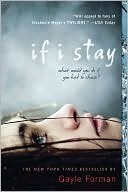Jerome Parisse's Blog, page 17
February 24, 2011
Sinking Maldives
Last weekend I went back to the Maldives for five days of pure indulgence. For a diver – and an old one at that since I started diving thirty years ago, when diving equipment paled in comparison with today's easy-to-use equipment – the Maldives are a must. Clear, warm waters, an explosion of colours - coral and fish – a delight for the senses, emotions guaranteed with every dive. Manta rays, turtles, sharks, cod-fish, clown fish, lion fish, dolphins, whale sharks to name a few… My first trip to these wonderful coral islands was twenty years ago. The atolls have not changed much, except maybe for increased tourism. Their beauty is staggering. Unfortunately, if climate change continues at the current rate and sea level continues to rise, they may very well find themselves under water in the future. Scary. The Maldivian Government has started to address the issue and in 2008, the President announced plans to look into purchasing land in India, Sri Lanka, and Australia.
A few facts you may not know about the Maldives:
They were an independent sultanate from 1153 to 1968 and a British protectorate from 1887 until independence on 25 July 1965
The islands spread over roughly 90,000 square kilometers
With an average ground level of 1.5 metres above sea level, it is the lowest country on the planet
Only 200 of the 1,190 or so islands are inhabited
The Maldives' population is roughly 300,000 (100,000 in the capital Male)
Tourism accounts for 28% of GDP
Islam is the only official religion of the Maldives; the open practice of all other religions is forbidden
The official and common language is Dhivehi
108 people died in the 2004 tsunami








February 23, 2011
If I Stay, by Gayle Forman
One millisecond, that's all it takes, and Mia loses everything dear to her heart. Her life is over. Or is it, really? After a terrible car accident, Mia finds herself outside her body, witnessing her family's and friends' distress, the effort of the medical team to save her life, her boyfriend's struggle to get the right to visit her in the ICU, and her own body fighting death… Soon Mia realises that her fate lies in her own hands. She faces a dilemma bigger than everything she's ever experienced, should she decide to stay – and face her losses – or move on to another dimension…
The issues of out-of-body experience, afterlife, and death that Mia faces interest me. In my latest novel Body Swap, the hero faces something similar. I was therefore looking forward to finding out how Gayle Forman dealt with those issues in If I Stay. The story is gripping. Mia's dilemma, her struggle, her hopes and fears become ours. It is impossible to read this novel without asking oneself the question of what we would do, would we find ourselves in Mia's situation. Forman's writing is full of vivid images, at times light and airy, at times strong and heavy, such as the minutes following Mia's accident. But they are always spot-on. I found the questions going through Mia's mind sometimes a little too obvious or brushed over too quickly, but overall, Forman did a very good job. I did get slightly annoyed at first though when the narrative went from the present to the past, and again, and again. I felt that the flashbacks slowed the action and were a little repetitive. But once you got to know the characters, it was fine. Some parts of the book seem to lack emotion at first, for example the cold way Mia watches the world from outside her body, but in fact it's a way for Forman to show the distance between the new Mia and her former life – that is until she finds herself dragged back into it – big time.








Author interview: Patrick Michael Murphy
Patrick Michael Murphy is offering TWO free copies of his novel, Across the Desperate Miles, to the first two persons who post a comment on this interview. The free copies are available in eBook format for the Kindle. The only condition for those interested is to post a review of the novel on Amazon.
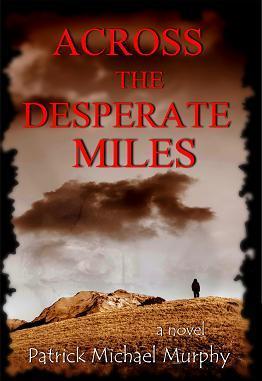 Jerome: What can you tell us about Across the Desperate Miles?
Jerome: What can you tell us about Across the Desperate Miles?
Patrick: Across the Desperate Miles is the current-day story of Kera and Rand Priven, a young couple who must journey across America to find and protect their children. The catch is, they are not getting along, at all, and, America is in the throes of a revolution brought about by outside and inside forces. There is war and anarchy within our borders. The systems have shut down. They are completely on their own. It's a story of transformation and survival.
Jerome: Who are your readers?
Patrick: I have had very positive feedback from 20somethings to 70somethings. I think it does well with contemporary fiction readers as well as action/adventure, thriller, military history, political readers, pop culture… and anyone wondering about the direction and future of the United States (and world really). The book is on Amazon and I don't really know anything about the people who purchase it, but it seems to appeal to readers on many levels.
Jerome: What was your journey as a writer?
Patrick: I started writing as a teen. I then joined the Army as a cameraman and travelled the world at a peaceful time, photographing pretty much anything I wanted, and a few I didn't want. I did very well there and in civilian life, won a couple Emmys for my photography and writing, but two decades later I was burned out on it and wanted to turn my own writing into a career. I am not going to say it's been easy, but I am going to say it's been a challenge and a lot of fun.
Jerome: Do you follow a specific writing process?
Patrick: Let's see. I am a fairly disciplined guy in many ways. But. There's always that but, isn't there? In filmmaking I learned about formulas and used them until I  became sick of them. I saw the ruin of formulas and yet, it seemed, everything was being done with them, especially TV and screenplays. I began experimenting, and had some great success. I think we are all so inundated with media that new approaches are often not new at all. But for me, the idea is to not simply recreate what you or others have done. Use courage. Go out on your own and believe in yourself. So I have used time-tested approaches for writing screenplays, essays, novels, and poetry, but my process is really to consider deeply what the piece is about and let it go its own way… within reason. I take long periods off between writing projects. But when I am writing I get obsessive. At least through a draft. Across the Desperate Miles was first written in the late nineties. Before the horror of 9/11. I sent it out a few times back then and then I shelved it. When I took it out again several months ago, at the urging of Jan Takac, my new editor, I planned to read it just to let her see it. But when I opened it all this new energy came out and with Jan's help I tightened it and rewrote two more times. So, I am not saying part of my process is to let a manuscript sit for 10 years, but this story is much better for the wait.
became sick of them. I saw the ruin of formulas and yet, it seemed, everything was being done with them, especially TV and screenplays. I began experimenting, and had some great success. I think we are all so inundated with media that new approaches are often not new at all. But for me, the idea is to not simply recreate what you or others have done. Use courage. Go out on your own and believe in yourself. So I have used time-tested approaches for writing screenplays, essays, novels, and poetry, but my process is really to consider deeply what the piece is about and let it go its own way… within reason. I take long periods off between writing projects. But when I am writing I get obsessive. At least through a draft. Across the Desperate Miles was first written in the late nineties. Before the horror of 9/11. I sent it out a few times back then and then I shelved it. When I took it out again several months ago, at the urging of Jan Takac, my new editor, I planned to read it just to let her see it. But when I opened it all this new energy came out and with Jan's help I tightened it and rewrote two more times. So, I am not saying part of my process is to let a manuscript sit for 10 years, but this story is much better for the wait.
Jerome: Where do you find inspiration?
Patrick: In life. Good God, it's all about. It helps to also have a deep desire to communicate and be understood. If you're feeling uninspired… travel. Look. Listen. Question. Go anywhere but your everyday places. I get bored, depressed, angry. I think we need to be ourselves, but look for the positive, and definitely use every emotion and every question that has ever come through you.
Jerome: Who are your favourite authors?
Patrick: Larry McMurtry, Wallace Stegner, Deepak Chopra, Peter Matthiessen, Ernest Hemingway and a lot of others. I also enjoy newer writers but the earlier ones helped shape me.
Jerome: Is there a book you wish you had written? Which one?
Patrick: No, but there are stories I'd liked to have lived. There are many books I marvelled at the talent it took to write. There is no question that great writing that moved me emotionally also inspired me to write.
Jerome: Do you have any tips for budding writers?
Patrick: I am now 53. Years pass quickly. I have always been impatient. Perhaps that is our worst enemy, impatience. Yes, go, yes, do, but also be patient with who you are, who you are with, and what you do. It's worth it. Write the pieces you have said time and again you want to write.
Jerome: What are you working on at the moment?
Patrick: Publicizing Across the Desperate Miles. And a collection of essays about my life and life in general. This will be out on Amazon in a couple of months. Then, my next novel.








February 16, 2011
Blacklands, by Belinda Bauer
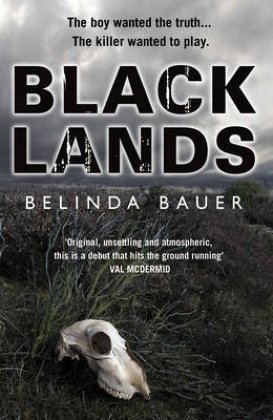 I first came across Blacklands by Belinda Bauer when I read a review of the novel on my friend Nikki-Ann's blog (you can find her review here). She raved about it, so I felt I had to read it. Blacklands is also one of the crime novels on the list of the Great Transworld Crime Caper.
I first came across Blacklands by Belinda Bauer when I read a review of the novel on my friend Nikki-Ann's blog (you can find her review here). She raved about it, so I felt I had to read it. Blacklands is also one of the crime novels on the list of the Great Transworld Crime Caper.
Blacklands tells the story of Steven Lamb, a twelve-year-old boy whose uncle Billy Peters was murdered by a pervert when he was only eleven. The murder has had a strong impact on the family, which has become somewhat dysfunctional since the event. Steven's grandmother (Billy's mother) never got over losing her son and pays little attention to Steven. To get a little bit of his grandmother's love that he is yearning for, Steven decides to find his uncle's body. To do this he starts writing to his uncle's murderer, who sits in a jail nearby. Starts a dangerous game of cat and mouse between Steven and Billy's murderer, which turns deadly when the pervert escapes from prison and looks for Steven with more than just a chat in mind.
Bauer mentions that when she started writing her book, she didn't have a crime novel in mind. Instead, what she wanted to write about was the story of a boy and his grandmother. Well, she certainly succeeded in that regard. The relationship between Steven and his grandma is fantastically portrayed and you find yourself suffering in silence in Steven's shoes. In fact, the relationship triangles in the whole family are wonderfully described, with Steven's younger brother Davey, his mother Lettie, and Lettie's boyfriend Uncle Jude all playing a big role. However, with the murderer's entrance, the story takes on a more sinister turn. Bauer has made smart use of the novel's environment. The eerie atmosphere of the Moors plays such a large role in the book that the landscape almost becomes a character with its own set of rules and even feelings. This is a great, psychological story. I find it hard to put it into a specific genre, and that's a good thing as far as I'm concerned: it is as much as a coming-of-age story than a crime novel or a story about grieving. I read it in two days and I am looking forward to Bauer's next book, Darkside.








My Three Friends

Zhou Sicong, Children at Play, 1991
I saw a wonderful exhibition today, which shows a selection of around 60 paintings and calligraphies by three artists, Lu Chen (1935–2003), Zhou Sicong (1939–1996), and Shi Hu (1942– ). Pictures are mostly in ink and colour on paper, and were collected by Dr Leung Kam Ching over the course of thirty years. Some of the pictures are exquisite; they need to be seen from various angles to realise the power that lies underneath each one. My favourite ones are from Shi Hu and Lu Chen. "A keen collector of Chinese antiquities, Dr Leung began to include contemporary paintings to his Jian Gu Xuan collection in the 1980s. Leung's interest in traditional Chinese culture, and specifically the expression of the human figure, can be seen as a consistent theme throughout his painting collection. Another prominent theme is that of friendship as Leung's collecting of these paintings arose out of his close personal relationships both with the husband and wife team of Lu Chen and Zhou Sicong, as well as with the iconoclastic contemporary artist Shi Hu." (Extract from the exhibition's brochure)
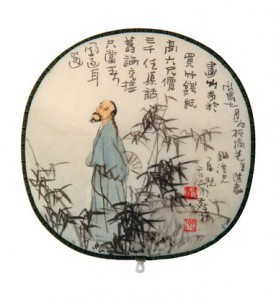
Lu Chen, Painter Zheng Banqiao, 1988
The exhibition was supposed to end on 15 February, but I went on the 16th and it was still open, so you may try your luck. I love the calligraphy below.

Shi Hu, Calligraphy Couplet, 1995
The exhibition is held at the University Museum and Art Gallery – UMAG
94 Bonham Road, Pokfulam (University of Hong Kong) – Hong Kong
Opening hours are Monday to Saturday 9:30 am to 6:00 pm; Sunday 1:00 to 6:00 pm
Admission is free.








February 15, 2011
Author interview: Melinda Clayton
I am starting a series of published authors' interviews. I plan to post one interview per week, usually on Wednesdays. I will endeavour to choose budding as well as established authors from a variety of genres. Today's interviewee is Melinda Clayton, a licensed psychotherapist and the author of Appalachian Justice. Melinda blogs at http://authormelindaclayton.xanga.com
 Jerome: What can you tell us about Appalachian Justice?
Jerome: What can you tell us about Appalachian Justice?
Melinda: In memoir form, Appalachian Justice tells the story of Billy May Platte, a half Irish, half Cherokee woman who learned the hard way that 1940s Appalachia was no place to be gay. As Billy May explains, "We was sheltered in them hills. We didn't know much of nothin' about life outside of them mountains. I did not know the word lesbian; to us, gay meant havin' fun and queer meant somethin' strange."
In 1945, when Billy May was fourteen years old and orphaned, three local boys witnessed an event that called Billy May's sexuality into question. Determined to teach her a lesson she would never forget, they orchestrated a brutal attack that changed the dynamics of the tiny coal mining village of Cedar Hollow, West Virginia forever.
Jerome: Who are your readers?
Melinda: What a great question! My readers tend to be both male and female, and are overwhelmingly comprised of people who want to feel a story. In other words, they want to be moved in some way, whether through outrage, sadness, or joy. They want to be active participants in the experience of the story.
Jerome: What was your journey as a writer?
Melinda: It's been an odd one. I'm a licensed psychotherapist and worked with clients 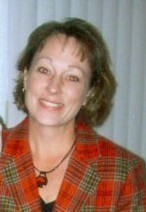 and in management in the mental health field for many years. When my children were small, it just became too difficult to be on emergency call all the time while trying to be available for them. I decided to take some time off to return to school to earn my doctorate. I had some free time on my hands, and I had always loved to write, and always told myself that someday I would write a novel. I began by selling articles to a variety of online and print magazines, covering relationship and mental health topics. From that, I went to writing short stories. I think several years of doing those things helped to prepare me for publication of a novel.
and in management in the mental health field for many years. When my children were small, it just became too difficult to be on emergency call all the time while trying to be available for them. I decided to take some time off to return to school to earn my doctorate. I had some free time on my hands, and I had always loved to write, and always told myself that someday I would write a novel. I began by selling articles to a variety of online and print magazines, covering relationship and mental health topics. From that, I went to writing short stories. I think several years of doing those things helped to prepare me for publication of a novel.
Jerome: Do you follow a specific writing process?
Melinda: I do. I find my brain works best early in the morning, so that's when I do research. Appalachian Justice takes place in a tiny coal mining village set deep in Appalachia, and although my mother's family is from the area, I still had to research the history and geography of the region. I also had to research the history of the Cherokee in that area. Once I'm satisfied with my research, I write until mid-afternoon. After that, the kids are home from school and the writing pretty much takes a backseat.
Jerome: Where do you find inspiration?
Melinda: Without a doubt, my inspiration comes from the hundreds of clients with whom I've worked over the years. I'm a psychotherapist by training, and I like to explore not only behaviors but the motivations behind those behaviors. Sometimes, I also like to shock people out of complacency by reminding them that ugliness is out there. Life can be pretty brutal. Fortunately, it can also be very beautiful.
Jerome: Who are your favourite authors?
Melinda: I have pretty eclectic tastes, so I like authors from several different genres. I love Ann Rule for true crime. I love everything John Steinbeck, because he makes me think, and he also loved to explore motivations. Stephen King has always been a favorite for the horror genre. And Jodi Picoult, Barbara Kingsolver, and Anita Shreve are some of my favorites for women's fiction.
Jerome: Is there a book you wish you had written? Which one?
Melinda: There are so many books I love, but one of my favorite contemporary novels is The Pilot's Wife, by Anita Shreve. The situations the protagonist finds herself in, and the choices she has to make, are gripping.
Jerome: Do you have any tips for budding writers?
Melinda: The single most important tip I have is for budding writers to revise, revise, revise. When you think you have a perfect document, set it aside for a couple of weeks and then go back and read it again. Chances are you'll find things that need to be changed.
Jerome: What are you working on at the moment?
Melinda: I'm working on the sequel to Appalachian Justice. Whereas Appalachian Justice was described by one reviewer as a fictional memoir, the sequel, working title Return to Crutcher Mountain, is best described as a mystery.








February 14, 2011
Janet Jackson in concert in Hong Kong
I went to see Janet Jackson in concert last night in Hong Kong. It was her first concert in her new world tour (35 countries), and following her fans' suggestions she had decided to start it in Hong Kong… on Valentine's Day! It took place in the Hong Kong Convention & Exhibition Centre, which probably didn't allow her to use the full features of a normal concert venue. In any case, it's not what I would call "a venue that will allow Janet to be up close and personal in a much more intimate setting", as her website mentions, but that was okay. Jackson moves well, and she didn't spare her energy. The songs she performed were all hits, so people could sing along with her. I enjoyed the show. There are a few things which didn't impress me though: I wish she interacted more with the audience for a start. Then, what is it about all the breaks in the show? I understand she needs time to change outfits and take a small rest, but these breaks were a bit boring and defused the energy. We had to sit through a slide show of her in various postures and dresses…. a real star. As for the last break, it was simply a black-out that lasted a few minutes…. In spite of all this, it was a good night. It's not that often that we get artists of this calibre performing in Hong Kong.
her new world tour (35 countries), and following her fans' suggestions she had decided to start it in Hong Kong… on Valentine's Day! It took place in the Hong Kong Convention & Exhibition Centre, which probably didn't allow her to use the full features of a normal concert venue. In any case, it's not what I would call "a venue that will allow Janet to be up close and personal in a much more intimate setting", as her website mentions, but that was okay. Jackson moves well, and she didn't spare her energy. The songs she performed were all hits, so people could sing along with her. I enjoyed the show. There are a few things which didn't impress me though: I wish she interacted more with the audience for a start. Then, what is it about all the breaks in the show? I understand she needs time to change outfits and take a small rest, but these breaks were a bit boring and defused the energy. We had to sit through a slide show of her in various postures and dresses…. a real star. As for the last break, it was simply a black-out that lasted a few minutes…. In spite of all this, it was a good night. It's not that often that we get artists of this calibre performing in Hong Kong.








I'm an accessory in The Great Transworld Crime Caper!
Transworld Publishers have launched a new reading challenge, The Great Transworld Crime Caper. For more information on it, check Between The Lines.
The three crime novels I have chosen for the challenge are:
1. Birdman by Mo Hayder
2. The Surgeon by Tess Gerritsen
3. If I Never See You Again by Niamh O'Connor
I love Mo Hayder's work, and I've heard lots of good things about Tess Gerritsen and Niamh O'Connor. I will be posting reviews of these books here soon. Stay tuned!








February 12, 2011
Xi'an's Terracotta Warriors – 兵马俑
My last post about Le Premier Jour, a book by Marc Levy, mentioned Xi'an, so I thought I should go on with my tour of China and post a few of my own photos of the Terracotta Army. The army was discovered by farmers in 1974. The figures, which date back from 210 BC, are slightly higher than human beings (of standard size!) and include warriors, chariots, horses, officials, acrobats, and musicians. It is an amazing sight, even if the display site itself is disappointing, a large iron structure that hides the figures rather than shows them properly. Most tours to China include a visit to the Army, and it is worth it. A large part of the army is still hidden under the earth and it will take time to bring them to the surface. Xi'an itself is an interesting city, with walls on which you can cycle with rent bikes (great views of the city from up there), many beautiful pagodas, mausoleums, the Bell Tower, and a fascinating Muslim quarter.








The First Day (Le premier jour) – Where is Marc Levy's respect for his readers?
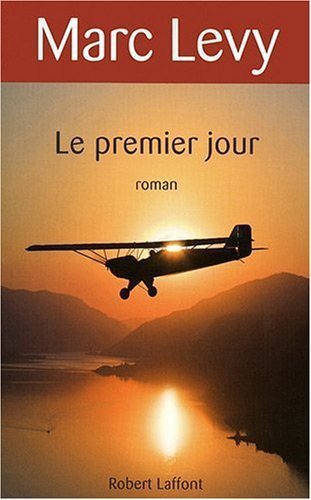 Among the great mysteries in the world of books and literature is Marc Levy's success. He is the most read French author outside French borders: 10 novels, 20 million copies sold, 41 languages… quite an achievement. Another mystery is why on earth I picked one of his book a few months ago. I had read Mes amis, mes amours a few years back, and didn't like it. So what possessed me to give him another go? What I found in Le Premier Jour (The First Day) appalled me. Levy doesn't write well, but that's okay. We all know that you don't need to know how to write to write books and be successful. There are innumerable examples of this. No, what really irked me this time is the obvious lack of respect of the author for his readers. The book is full of blatant errors which show that he didn't even research his facts before writing his novel. Let me give you a few examples so that you understand where I am coming from. The two protagonists are an astrophysicist and an archeologist (I don't know enough about archeology and Ethiopia to be in a position to say anything about that aspect of things, but I bet it's full of inaccuracies like the rest.) The astrophysicist is searching for "the first star, the mother of all stars…." (sic). The descriptions of world astronomy sites are wrong: telescopes are described as ten story buildings, when in reality they are only twelve meters in diameter, for example. The story's heroes land in the Nicobar islands in India and see… toucans (which only live in Latin America). They travel from Europe to China – They want to go to Xian – so they book a flight to Beijing and rent a brand new four-wheel drive!!! For those who have never been to China, you should know that you cannot rent cars in China, because you are not allowed to drive with non-Chinese licences. What you do is rent a car with a chauffeur. Levy must have realised there was a problem because he says his hero was smart enough to use a GPS to drive all the way to Xian (probably to avoid having to read road signs in Chinese… very smart…). A GPS in China? How ridiculous. And no one in their own minds would dream of driving from Beijing to Xian – You fly. But of course the heroes had to drive, otherwise they would never come across Hua Shan… Too easy, Mr Levy. Oh, and what about this one? Get ready. From Xian, the protagonists need to fly to the Nicobar Islands, so they simply rent a small, old plane (with a pilot this time!), which takes them there and back in 48 hours or so… And how do they cross some of the best protected borders in the world? "By Flying low, and crossing borders at lunch time when custom officers are having lunch…" (Please take a breath.) Guess what? You reach the end of the 500 page book to discover that the story doesn't end there, but that there is a second part (The First Night), which you need to buy if you want to know the end of the story… Great marketing device, but too low for my liking! Enough said, you won't hear another word from me about this author.
Among the great mysteries in the world of books and literature is Marc Levy's success. He is the most read French author outside French borders: 10 novels, 20 million copies sold, 41 languages… quite an achievement. Another mystery is why on earth I picked one of his book a few months ago. I had read Mes amis, mes amours a few years back, and didn't like it. So what possessed me to give him another go? What I found in Le Premier Jour (The First Day) appalled me. Levy doesn't write well, but that's okay. We all know that you don't need to know how to write to write books and be successful. There are innumerable examples of this. No, what really irked me this time is the obvious lack of respect of the author for his readers. The book is full of blatant errors which show that he didn't even research his facts before writing his novel. Let me give you a few examples so that you understand where I am coming from. The two protagonists are an astrophysicist and an archeologist (I don't know enough about archeology and Ethiopia to be in a position to say anything about that aspect of things, but I bet it's full of inaccuracies like the rest.) The astrophysicist is searching for "the first star, the mother of all stars…." (sic). The descriptions of world astronomy sites are wrong: telescopes are described as ten story buildings, when in reality they are only twelve meters in diameter, for example. The story's heroes land in the Nicobar islands in India and see… toucans (which only live in Latin America). They travel from Europe to China – They want to go to Xian – so they book a flight to Beijing and rent a brand new four-wheel drive!!! For those who have never been to China, you should know that you cannot rent cars in China, because you are not allowed to drive with non-Chinese licences. What you do is rent a car with a chauffeur. Levy must have realised there was a problem because he says his hero was smart enough to use a GPS to drive all the way to Xian (probably to avoid having to read road signs in Chinese… very smart…). A GPS in China? How ridiculous. And no one in their own minds would dream of driving from Beijing to Xian – You fly. But of course the heroes had to drive, otherwise they would never come across Hua Shan… Too easy, Mr Levy. Oh, and what about this one? Get ready. From Xian, the protagonists need to fly to the Nicobar Islands, so they simply rent a small, old plane (with a pilot this time!), which takes them there and back in 48 hours or so… And how do they cross some of the best protected borders in the world? "By Flying low, and crossing borders at lunch time when custom officers are having lunch…" (Please take a breath.) Guess what? You reach the end of the 500 page book to discover that the story doesn't end there, but that there is a second part (The First Night), which you need to buy if you want to know the end of the story… Great marketing device, but too low for my liking! Enough said, you won't hear another word from me about this author.








Jerome Parisse's Blog
- Jerome Parisse's profile
- 25 followers










